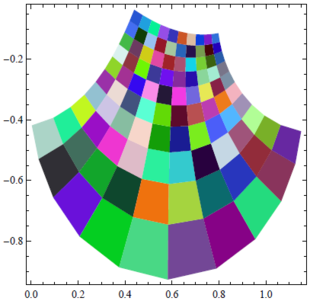12-240/Classnotes for Tuesday October 2: Difference between revisions
| (10 intermediate revisions by 2 users not shown) | |||
| Line 8: | Line 8: | ||
== Subspace == |
== Subspace == |
||
Remind about the theorem of subspace: a subset W ⊂ V is a subspace iff is is closed under the operations of V |
Remind about the theorem of subspace: a non-empty subset W ⊂ V is a subspace iff is is closed under the operations of V and contains 0 of V |
||
Proof: |
Proof: |
||
First direction "=>": |
|||
if a non-empty subset W ⊂ V is a subspace , then W is a vector space over the operations of V . |
|||
=> + W is closed under the operations of V. |
|||
+ W has a unique identity of addition: <math>\forall\!\,</math> a <math>\in\!\,</math> W: 0 + a = a |
|||
Moreover, a a <math>\in\!\,</math> V. Hence 0 is also identity of addtition of V |
|||
Second direction "<=": |
|||
if a non-empty subset W ⊂ V is closed under the operations of V and contains 0 of V |
|||
we need to prove that W is a vector space over operations of V, hence, and subspace of V. |
|||
Namely, we need to show that W satisfies all axioms of a vector space, but now we just consider some axioms and leave the rest to readers. |
|||
VS1: Consider <math>\forall\!\,</math> x,y <math>\in\!\,</math> W => a,b <math>\in\!\,</math> V |
|||
While V is a vector space |
|||
thus x + y = y + x ( and the sum <math>\in\!\,</math> W since W is closed under addition) |
|||
VS2: (x + y) + z = x + (y + z) is proven similarly |
|||
VS3: As given, 0 of V <math>\in\!\,</math> W, pick any a in W ( possible since W is not empty) |
|||
So, a <math>\in\!\,</math> V hence a + 0 = a |
|||
Thus 0 is also additive identity element of W |
|||
== Class Notes == |
== Class Notes == |
||
<gallery> |
<gallery> |
||
12-240-Oct-2-Page-1|Page 1 |
Image:12-240-Oct-2-Page-1.jpg|Page 1 |
||
12-240-Oct-2-Page-2|Page 2 |
Image:12-240-Oct-2-Page-2.jpg|Page 2 |
||
12-240-Oct-2-Page-3|Page 3 |
Image:12-240-Oct-2-Page-3.jpg|Page 3 |
||
12-240-Oct-2-Page-4|Page 4 |
Image:12-240-Oct-2-Page-4.jpg|Page 4 |
||
12-240-Oct-2-Page-5|Page 5 |
Image:12-240-Oct-2-Page-5.jpg|Page 5 |
||
</gallery> |
</gallery> |
||
Latest revision as of 04:43, 7 December 2012
| |||||||||||||||||||||||||||||||||||||||||||||||||||||||||
The "vitamins" slide we viewed today is here.
Today, the professor introduces more about subspace, linear combination, and related subjects.
Subspace
Remind about the theorem of subspace: a non-empty subset W ⊂ V is a subspace iff is is closed under the operations of V and contains 0 of V
Proof:
First direction "=>":
if a non-empty subset W ⊂ V is a subspace , then W is a vector space over the operations of V .
=> + W is closed under the operations of V.
+ W has a unique identity of addition: a W: 0 + a = a
Moreover, a a V. Hence 0 is also identity of addtition of V
Second direction "<=":
if a non-empty subset W ⊂ V is closed under the operations of V and contains 0 of V
we need to prove that W is a vector space over operations of V, hence, and subspace of V.
Namely, we need to show that W satisfies all axioms of a vector space, but now we just consider some axioms and leave the rest to readers.
VS1: Consider x,y W => a,b V
While V is a vector space
thus x + y = y + x ( and the sum W since W is closed under addition)
VS2: (x + y) + z = x + (y + z) is proven similarly
VS3: As given, 0 of V W, pick any a in W ( possible since W is not empty)
So, a V hence a + 0 = a
Thus 0 is also additive identity element of W








